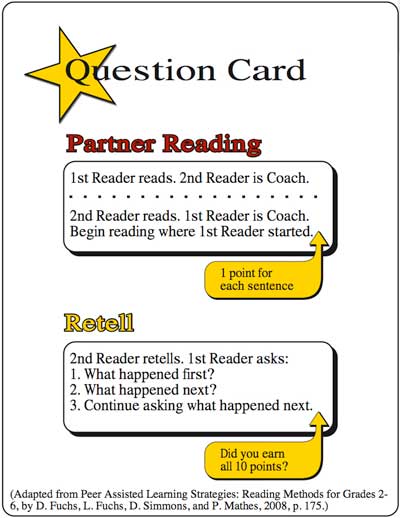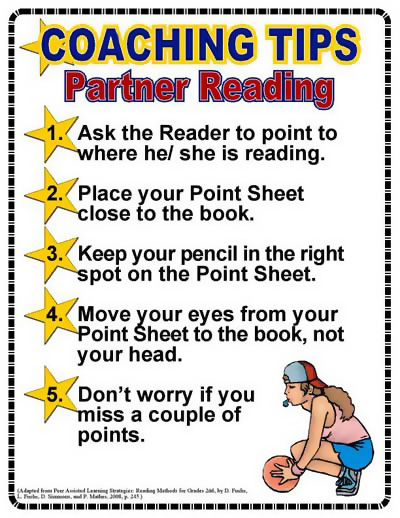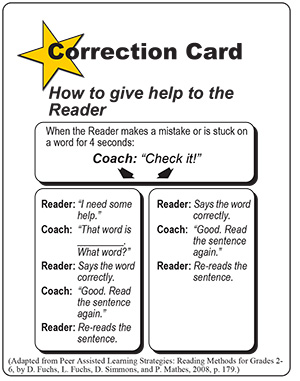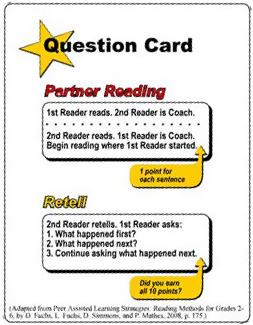What types of activities can Mrs. Nash use to increase her students’ reading skills?
Page 4: Partner Reading with Retell
 The first activity in each PALS session is Partner Reading, sometimes referred to as Partner Reading with Retell. Mrs. Nash feels that this activity will benefit her students. Partner Reading has been shown to improve reading accuracy and fluency, and story retelling has been demonstrated to enhance reading comprehension. The activity consists of three main steps, which are outlined in the box below.
The first activity in each PALS session is Partner Reading, sometimes referred to as Partner Reading with Retell. Mrs. Nash feels that this activity will benefit her students. Partner Reading has been shown to improve reading accuracy and fluency, and story retelling has been demonstrated to enhance reading comprehension. The activity consists of three main steps, which are outlined in the box below.
| Partner Reading with Retell (11–12 minutes) |
|
|
Step 1. The higher-performing student reads first for five minutes. Step 2. The lower-performing student reads the same text for five minutes. Step 3. The lower-performing reader takes one or two minutes to retell the story.
Review Description of Question Card This cue card contains simple guidelines for the Partner Reading and Retell activities. Partner Reading
Retell
Note: All cards available on Resource Page 8.
Print this section
  Review Description of Question Card This cue card contains simple guidelines for the Partner Reading and Retell activities. Partner Reading
Retell
Note: All cards available on Resource Page 8.
Print this section
  Review Description of Coaching Tips Card This cue card includes reminders and tips to help the Coach successfully manage the Retell part of the PALS session.
Note: All cards available on Resource Page 8.
Print this section
Note: Unlike in the Partner Reading phase, in Paragraph Shrinking the partners will read from different parts of the same text.
|
As each student reads, the student Coach monitors and offers corrective feedback when the Reader commits one of these word recognition errors:
- Saying the word wrong
- Adding a word
- Leaving out a word
- Pausing for more than four seconds
During training, teachers should take care to emphasize that making mistakes is okay, because it’s by making mistakes that students will learn words they didn’t know before. Teachers should train students to identify and correct four types of word recognition errors as they occur.
- Sayi
 ng the word wrong
ng the word wrong - Adding a word
- Leaving out a word
- Pausing for more than four seconds
When the reader makes one of these errors, the Coach should follow the procedures outlined below.
- The Coach says, “Check it!”
- The Coach allows the reader time to supply the correct word.
- If the Reader is unable to do so, the Coach provides the word and requests repetition, saying, “That word is _____. What word?”
- The Reader repeats the word and, upon the Coach’s prompting, reads the sentence again.
Note: All cards available on Resource Page 8.
Note: This exact procedure and script are used for all error types, even though they may not accurately address the error. This helps the students to memorize one procedure and use it automatically, in turn allowing them to spend more time engaged in a reading activity. More advanced students might tailor the script to fit each error type, but the teacher should neither encourage nor promote their doing so.
PALS in Action
View the movies below to observe student pairs participating in Partner Reading and Story Retell.
Transcript: Partner Reading
Male Student: “Today cowboys sing in Texas. They sing yippee-yi yippee-yeah. Everyone knows how…”
Female Student: Stop. You missed that word. Can you figure it out?
Male Student: “Everyone.”
Female Student: No, that word is “everybody.” What word?
Male Student: “Everybody.”
Female Student: Good. Read the sentence again.
Male Student: “Everybody knows how cowboys sing today in Texas. But it was not always so. Things were once…quiet once in Texas. Long ago, cowboys were silent…”
Teacher: Stop. Change jobs. (Students exchange materials.)
Teacher: Start.
Female Student: “Today cowboys sing in Texas. They sing yippee-yi yippee-yeah…”
Transcript: Story Retell
First Student: What did you learn first?
Second Student: Um, I learned that the Dodgers were playing the Cubs at Ebbets Field.
First Student: Good. What did you learn next?
Second Student: I don’t know.
First Student: Okay. A fan brought the sandwich…two sandwiches and the money and the autograph ball…just a ball…
Second Student: Yeah.
First Student: Yeah. To get it autographed. And so what did you learn next?
Second Student: I learned that he took the subway to the field and sat on a bleacher seat.
First Student: Good. Two points. What did you learn next?
Second Student: I learned that he saw a couple of the players warming up for the game.
First Student: Good.
